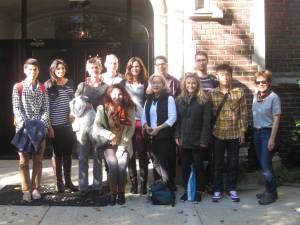On a windy autumn day in early October, a group of residents and board members traveled to the Smithsonian Biological Conservation Institute, located in the Shenandoah Valley, Virginia. The Institute houses the National Zoo’s research center and endangered animal breeding facilities. It only opens once a year to the public. While ISH board members had planned to bring a group of residents to the open house last fall, the Institute unfortunately canceled the event due to the government shutdown.

We learned that the land was originally the site of a U.S. Army Remount Service depot, where horses were trained for service in both World Wars. After World War II, the site was transferred to the Department of Agriculture and eventually given to the Smithsonian in 1975. In contrast to the National Zoo’s enormous diversity of animals, the Institute houses a small collection of endangered species, including red pandas, snow leopards, maned wolves, and kiwis. There were also many scientists exhibiting their research projects. One particularly interesting Smithsonian initiative uses satellite imagery to map forest destruction around the world. Overall, it was a pleasant, interesting day and refreshing to breathe fresh mountain air outside the city.

On a separate note, one of the best parts of living at ISH is the chance to partake in interesting conversations at dinner every night. I participated in a compelling discussion last week with two Chinese residents, a Finnish student and several American residents. It started when one resident brought up the recent pro-democracy protests in Hong Kong.
The Chinese residents remarked that in their personal experiences, American students too quickly assume that democracy is the best form of government. One of the Chinese residents suggested that this has to do with upbringing, such as the reverence of the American Revolution as taught in American classrooms. She said that other systems are too quickly denounced, arguing that the Chinese system, while heavily criticized in Western media, has been beneficial for the country. China has experienced unprecedented economic and social growth over the last several decades under its current political system. Additionally, recent government initiatives are attempting to root out corruption and improve educational standards.
The Finnish and American residents responded that while its recent growth is undeniable and admirable, China still has a long way to go in regard to human rights. One resident mentioned the Chinese government’s censoring of the Internet and the persecution of outspoken citizens, such as artist Ai Wei Wei. Additionally, the Finnish resident noted, the U.S. Constitution and democratic system is one of the most stable political systems ever created.
The Chinese residents countered that most people know how to easily access blocked websites, though indeed, the government does place restrictions on the population’s access. Perhaps their strongest counterargument, however, was their point that China isn’t ready for democracy. Its people do not yet have an adequate educational level to make informed decisions. Given China’s economic situation of the 20th century and today, a top-down government has been most effective. This has allowed for rapid implementation of national policies. Furthermore, though the government may limit rights to free speech and expression, it is continuing to provide greater social welfare programs. It is therefore not fair to equate the government of China with much harsher totalitarian regimes like those that exist in the Middle East. Perhaps one-day China could gradually transition into a democracy, but it is not ready yet. If China shifted to democracy today, it would be disastrous.
The Chinese residents shrewdly observed that lately, democracy is not working so effectively in the United States. An American resident pointed out that democracy is designed to be “messy,” and that the U.S. is not a direct democracy, but a democratic republic. I added that the political problems the U.S. faces today are not necessarily due to problems with the political system; gerrymandering and flexible campaign finance laws, for instance, have distorted the vision of our founding fathers, rendering citizens powerless in the face of political gridlock.
The debate continued for about an hour, long past the completion of our meals. We seemed to reach a consensus that in an ideal world removed from political and economic constraints, democracy would be favorable; it gives citizens a high level of control over the future of their country and ubiquitous civil rights. Yet given the complexities of the world today, the implementation of democratic systems may be too idealistic. Moreover, the conversation ended with everyone questioning their own beliefs, which is exactly what ISH is all about.







